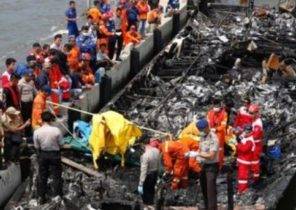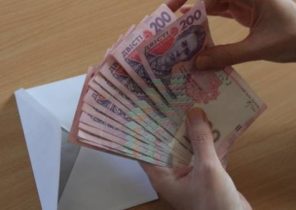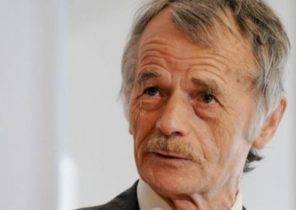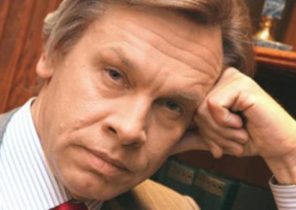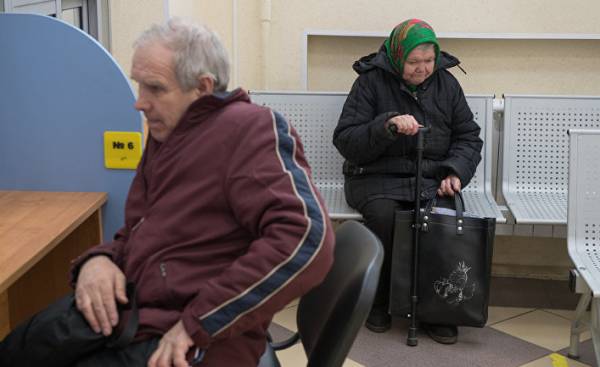
MOSCOW — in order to find the almond, you have to get to the day a bowl of rice porridge, which the international monetary Fund was filed last week after his visit to Moscow.
In the so-called concluding statement published Monetary Fund after the visit, as usual, contains an analysis of the main trends of the Russian economy.
Fund economists note that in 2017 after two years of recession, economic growth in Russia will amount to 1.4%, and it was the kindest words about the economic policy of the government and the Central Bank attempts to keep inflation under control, as expected.
But at the end of the document there are two lines, which — despite the diplomatic language, strike at the heart of the current heated debate in Russia in the economic and social field.
“Pension reform and the increasing age of retirement could help to mitigate negative demographic trends in the labor market,” write the economists of the Monetary Fund.
It may seem that it is quite innocent remark, but the Russian media have a different opinion, and they immediately attacked the French Director of the Fund.
“The international monetary Fund gave Russia an unpopular tips: initiatives Christine Lagarde can lead to social conflicts,” writes the daily Moscow newspaper “Nezavisimaya Gazeta” on the first page of numbers on Monday. Because although the number of Russian regions — including Moscow and is already experiencing labor shortages, however, any talk about changing the retirement age, pensions and financing of the system — issues are very sensitive politically.
“It is obvious that such measures will become a destabilizing factor,” — assesses the situation in the newspaper Tatyana Mineeva, the Vice-President of the employers ‘ organization “Business Russia”.
RUSSIAN CROSS
• After the collapse of the Soviet Union in 1991 the birth rate fell sharply, and increased mortality.
• In 1987, the birth rate increased by 2.2, and in 1999, decreased to 1.2.
• However, in the 1990-ies dramatically increased the mortality, the average life expectancy for men dropped to 57 years.
• This motion when the two graphs cut each other, received the name “Russian cross”.
• The stability of the Russian population provided only mass immigration, today the population is about 146 million people.
Sources: Roskomstat, JP
Since the fall of the USSR the Russian pension system has undergone very little modernization.
Women in Russia can retire when they turn 55 years old, retirement age for men is 60 years.
Pensions, which are paid primarily from the state budget, as a rule, very low.
In Moscow, the pension is about 14 thousand rubles per month (i.e. approximately 1,600 Danish crowns), because city officials to pay a premium, but outside the capital the pension is even lower, down to about 9000 rubles (around 1000 DKK).
With regard to the retirement age, supporters of the status quo point to the fact that Russia, if compared with most industrialized countries, uses to pay pensions to a very small part of its GDP of about 3% compared to 10-15% in countries such as Japan, France and Italy, according to business magazine “Profile”.
Small pensions mean that millions of retirees continue to work after they reach official retirement age, which some economists are now proposing to increase to 63 years for women and 65 years for men.
It is expected that liberal economist-reformer Alexei Kudrin put forward arguments in favour of such a measure in the program that he develops for the administration of President Vladimir Putin; this view has the support and, in particular, in the Russian Ministry of Finance.
But economic observers have very mixed opinions on this issue.
“How can you raise the retirement age for men to 65 years, when the projected life expectancy of 65.9 years (as in 2015)? Is it really necessary to work all life to earn a pension, and then to get it less than in a year’s time?” — comments on the proposals Alexei Mikhailov, chief editor of the magazine “Profile”.
A public opinion poll conducted in late 2015, the independent public opinion research Institute Levada, showed that only 11% of respondents support a gradual increase in the retirement age, while 81 percent opposed the measure.
But supporters of pension reform indicate that Russia faces a serious demographic problem that demands action: the death rate still exceeds birth rate, especially among men, in the coming years, the birth rate drops, because now the family is created by those who were born in 1990-e years when the birth rate was low.
According to the information contained in the report of the world Bank, Russia risks to face the fact that in the period to 2050, the number of labor resources in the country would decline by about 20 million — this corresponds to every fourth occupied currently, if you do not take political action to change current trends.
“Russia has managed in recent years to reduce the mortality rate, but low birth rate remains a problem. It is necessary that each woman had 2.2 of the child, but such large numbers were not since the collapse of the Soviet Union,” says Aage V. Nielsen (Aage V. Nielsen), Director of the consulting firm Vitus Bering Management from Moscow.
In the 1990-ies the birth rate in Russia fell to 1.2, which at the time was due to the economic crisis, but since then the situation had improved somewhat, in 2015, the figure was 1.8 in particular because of the increased government assistance to families with children.
While the average life expectancy for men is only slightly raised above the level in 65 years — and still is a significant improvement compared to such a low level as 57 years in 1990-e years, — it is expected that Russian women on average will live almost 77 years, according to official data.
Although reduced mortality in recent years and has helped to improve the market supply of labour, Russia has had to import millions of migrant workers, particularly from Central Asian States to perform unskilled work.
The development of demographic situation is one of many factors contributing to the fact that Russia does not expect much economic growth in the future.
“In the medium term, growth will be muted, to a level of about 1.5% because of structural “bottlenecks” (e.g., demographic, and technological), as well as the continuation of the sanctions policy, which limits the growth potential of the investment,” writes the IMF in a statement last week.
